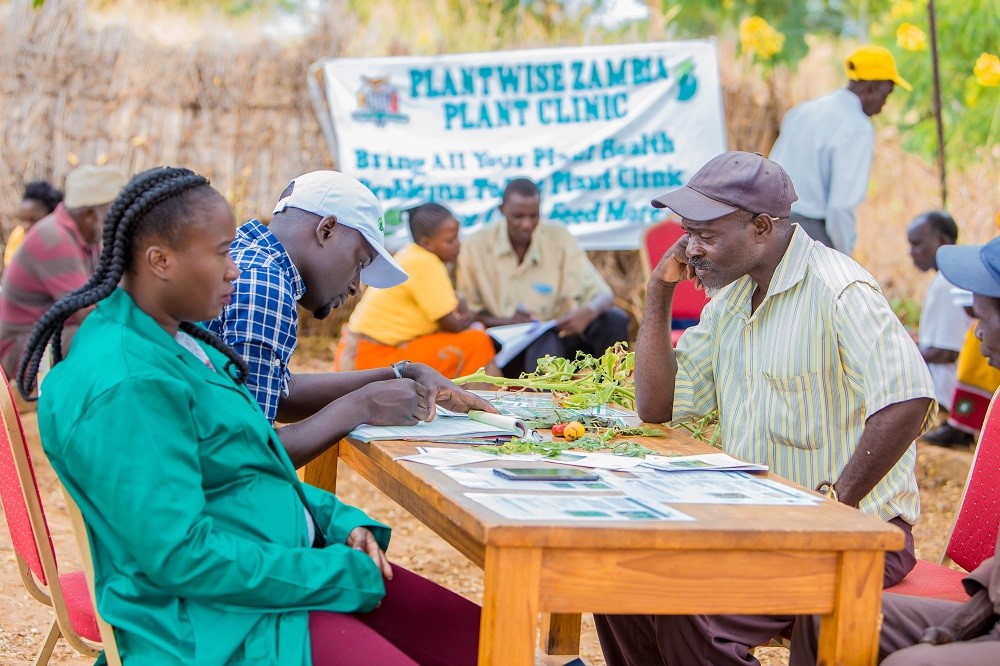
The increasing prevalence of devastating crop pests, such as the Fall armyworm (FAW), has led to a growth in pesticide use among smallholder farmers in sub-Saharan Africa. Crop pests are a major limiting factor of agricultural productivity growth worldwide and in Sub-Saharan Africa, in particular, crop losses due to pests are predicted to be 40% to 60%.
Dr Justice Tambo, lead author of a recent study published in the journey Food Policy, surveyed 1,474 farm households in Rwanda and Zambia to explore whether CABI-led Plantwise plant clinics, in addition to providing plant health diagnostics and advisory services, can also aid farmers in the proper use of pesticides and the wearing of Personal Protective Equipment (PPE).
Plant clinics, which are set up at public places such as markets and village centres, allow any farmer to bring a sample of any ‘sick’ crop where a plant doctor will be able to identify, diagnose and recommend treatment for the farmer to consider.
The study found that plant clinics in Rwanda and Zambia help promote more sustainable ways to fight crop pests and diseases, in particular, the judicial use of pesticides within Integrated Pest Management (IPM) plans.
The scientists, which include researchers from the Rwanda Agriculture and Animal Resources Development Board (RAB) and the Zambia Agriculture Research Institute (ZARI), found that although farmers who visit plant clinics show a higher probability of opting for pesticides for pest control, they do not use them intensively and are more likely to adopt safer and more sustainable alternatives.
In addition, plant clinic users display a higher instance of combining pesticide use with non-chemical methods of pest control such as crop rotation and handpicking of egg masses and larvae.
Specifically, the researchers found that in both Rwanda and Zambia plant clinic users spent less on pesticides per unit of land compared to non-users, with a statistically significant difference in the case of Zambia. They also saw discernible differences in the amount spent on pesticide across the two countries.
For example, the per hectare pesticide expenditure incurred by Rwandan farmers is about 5 to 6 times that reported by their counterparts in Zambia. Besides differences in the type and cost of pesticides, the small farm size and the relatively higher number of sprays per season in Rwanda may explain the huge disparity in the per hectare pesticide expenditures between the two countries, the study suggests.
Dr Tambo said, “In this study, we investigated whether plant clinics can enhance rational use of pesticides, in terms of reduced use of highly toxic or banned pesticides, adoption of alternative and environmentally friendly pest management practices, proper disposal of pesticide wastes, use of Personal Protective Equipment (PPE), and the implications for incidence of pesticide-related ill-health.
“Indeed, our results show that despite using several moderately and highly hazardous chemicals, some of the farmers did not wear any protective clothing while handling the pesticides. This was particularly the case in Rwanda where about 35% of the farmers sprayed pesticides without wearing any PPE. Our data further shows that only 5% and 12% of the pesticide applicators in Rwanda and Zambia, respectively, used the full set of PPE.”
The scientists argue that the IPM paradigm aims to reduce reliance on pesticides by encouraging the use of a combination of sustainable pest control practices. IPM techniques include judicious use of pesticides, as well as non-chemical pest management practices, such as intensive monitoring, resistant varieties, cultural control, physical or mechanical control and biological control.
Dr Tambo added, “Although plant clinic users were significantly more likely to wear protective clothing while working with pesticides, overall there was an inadequate use of PPE, with many smallholder farmers reporting incidences of dizziness, headaches and other acute pesticide health symptoms.
“The plant clinic extension approach would benefit from scaling so as to promote IPM adoption in smallholder agriculture. Further training could also be given to the small percentage of farmers to help steer clear of banned, restricted or wrong pesticides as well as proper use of PPE.”
In collaboration with national partners, the Plantwise programme has established around 4,500 plant clinics in 34 countries across Africa, Asia and Latin America. In Rwanda, there are 66 active plant clinics that are manned by 230 trained plant doctors. Similarly, Zambia has 121 plant clinics that are staffed by 352 plant doctors.
At the time of this study, these plant clinics had attended to 16,130 and 12,000 farmers’ queries on about 100 crops in Rwanda and Zambia respectively, signifying their growing popularity and importance as a source of plant health information.
Additional information
Main image: A farmer attends a plant clinic in Zambia for advice on how to deal with his diseased crop (Credit: CABI).
Full paper reference
Justice A. Tambo, Dannie Romney, Idah Mugambi, Fredrick Mbugua, Mary Bundi, Bellancile Uzayisenga, Mathews Matimelo and Mathias Ndhlovu, ‘Can Plant Clinics Enhance Judicious Use of Pesticides? Evidence from Rwanda and Zambia,’ 22 March 2021, Food Policy, DOI: 10.1016/j.foodpol.2021.102073
The paper can be viewed open access here: https://www.sciencedirect.com/science/article/pii/S0306919221000506?via%3Dihub
Acknowledgements
This research was funded by the CABI-led Plantwise programme, which is financially supported by the Foreign, Commonwealth & Development Office (FCDO), United Kingdom; the Directorate- General for International Cooperation (DGIS), Netherlands; the Swiss Agency for Development and Cooperation (SDC); the European Commission (DG DEVCO); the Australian Centre for International Agricultural Research (ACIAR); the Ministry of Agriculture of the People’s Republic of China; Irish Aid; and the International Fund for Agricultural Development (IFAD).
1 Comment
Leave a Reply
Related News & Blogs
Post-registration pesticide reviews: Experiences, learnings and best practices
CABI’s PlantwisePlus programme recently hosted a webinar to raise awareness and potential solutions to the challenges around post-registration pesticide reviews – a vital stage in the review process that helps ensure compliance with safety regulations…
9 July 2025





very good article recommended for use by the farmers, Agricultural Extension officers and other stake holders in Africa on the safe use of pesticides and plant clinic approach